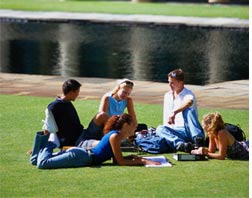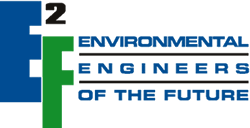

Participating University Application
Environmental Engineers of the Future (E2F) is a program funded by employers in the field of environmental engineering who are interested in encouraging students to pursue a Master’s degree in environmental engineering. The program targets students in ABET accredited bachelor of science in engineering programs who are in their last undergraduate year.
All universities offering a program compatible with E2F requirements are encouraged to participate. To participate in the program, interested universities should complete a brief application, providing detailed course descriptions which demonstrate that the university has a program that fulfills all the E2F requirements. Applications will be processed in the order that they are received, so universities are encouraged to respond as soon as possible.
The goal of E2F is to encourage undergraduates in accredited engineering schools, who have a broad interest in the areas of water, wastewater, solid waste, air quality, water resources, hazardous waste, sustainable engineering and energy recovery, to continue their education by pursuing a Master's degree in environmental engineering.
E2F requires that participating universities offer an M.S. program where the student can take a minimum of five required courses on the university campus (i.e., the five required courses can not be taken on-line). These include two core courses: one in physiochemical treatment and another in biological treatment. Each of these two core courses must be at least 3 semester units, 4 quarter units, or the equivalent. The additional three courses may be drawn from a list of courses approved by the E2F Curricula Committee.
Universities in the program must meet the following requirements:
- Offer the core courses required by E2F.
- Offer a suitable selection of six or more electives, from which students may select to complete the requirements of the program.
- Agree to supervise the student to ensure that the courses required by E2F are available and completed.
- Regularly provide E2F with updated information about the university’s Environmental Engineering program, especially the availability of pre-approved core and elective courses listed on this website.
- Designate a responsible contact person who will serve as the conduit for all communications between E2F and the university.
For each course listed, a course description (e.g. course catalog excerpt) must be included.
Elective courses
There are not rigid rules concerning elective courses, only that the school’s list of electives must be submitted to E2F and approved by the E2F Curricula Committee. Examples of such courses include water chemistry, water chemistry laboratory, process engineering laboratory, air quality, design of environmental facilities, surface and/or groundwater hydrology, chemical kinetics, environmental microbiology, industrial waste management, membrane processes, fate and transport, risk assessment, and solid waste management. In developing a list of elective courses, universities are encouraged to study the list of approved courses for universities already participating in E2F.
| Home | Why | What | Where | Forward | My Career |
| Program | Sponsoring Organizations |
| Universities | How To Apply | Frequently Asked Questions | Application |

